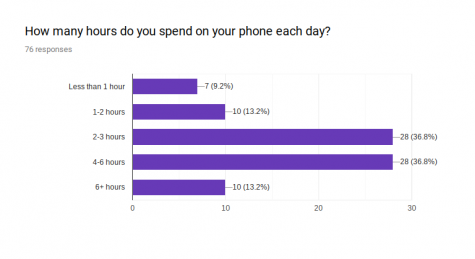How Your Cell Phone Could Be Running Your Life
April 16, 2019
When the words ‘excess screen time’ are mentioned, what do you think of?
Does the imminent threat of cell phone addiction come to mind?
50 percent of teens feel that they are ‘addicted’ to their phones, according to a 2016 poll by Common Sense Media.
The same Common Sense poll also stated that 72 percent of teens feel pressured to respond to notifications or texts right away.
Screens are everywhere – whether it be at home, school, or work – and they’re not going away.
Many current teenagers and college freshman have grown up around technology, and most have adapted to the heavy use of technology in the classroom.
However, with the cultural pressure of having your phone on you at all times and the social pressure of the fear of missing out (FOMO), being either alone or present in the moment can seem impossible.
A 2018 study from Preventative Medicine about children and adolescent screen time stated that participants who had higher amounts of screen time were linked to “… less curiosity, self-control, and emotional stability.”
Not only is excess screen time physically bad for you, but it can take a large toll on your mental wellbeing as well.
A recent article by NPR explained that in a study by the Journal of the American Medical Association, “The study followed 2,587 10th graders in schools in Los Angeles county over two years. The teens showed no symptoms of ADHD at the beginning of the study. By the end, teens with more frequent digital media use were more likely to have symptoms of ADHD.”
Students were surveyed recently to see how much screen time affected their health.
Out of 76 participants, 28 said they spend four to six hours on their phone everyday, with 28 participants who said they spend two to three hours on their phone.
Though most answered that their cell phone usage did not interfere with homework and everyday activities, participants still acknowledged that cell phones can turn into a distraction when not used properly.
When asked about symptoms they experienced due to excessive screen time, 39 participants said they have experienced lack of sleep, and 27 participants said they have experienced headaches.
20 participants said they experienced lack of attention or inability to pay attention due to cell phone usage.
It’s no surprise, then, that many young people are trying to limit their cell phone usage and screen time because of the negative effects involved.
Most phones have a built-in screen time clock, which can be accessed through a bit of searching in settings.
Features like Screen Time for iOS and Digital Wellbeing for Android can help limit the amount of time you spend on your phone.
Using the included features, you can set timers on certain apps to help decrease your screen time and view your data which includes how much you use your phone and specific app frequency and much more.
Being glued to your cell phone can be a thing of the past with a little work and dedication, and you can help your future self with one simple decision today.
